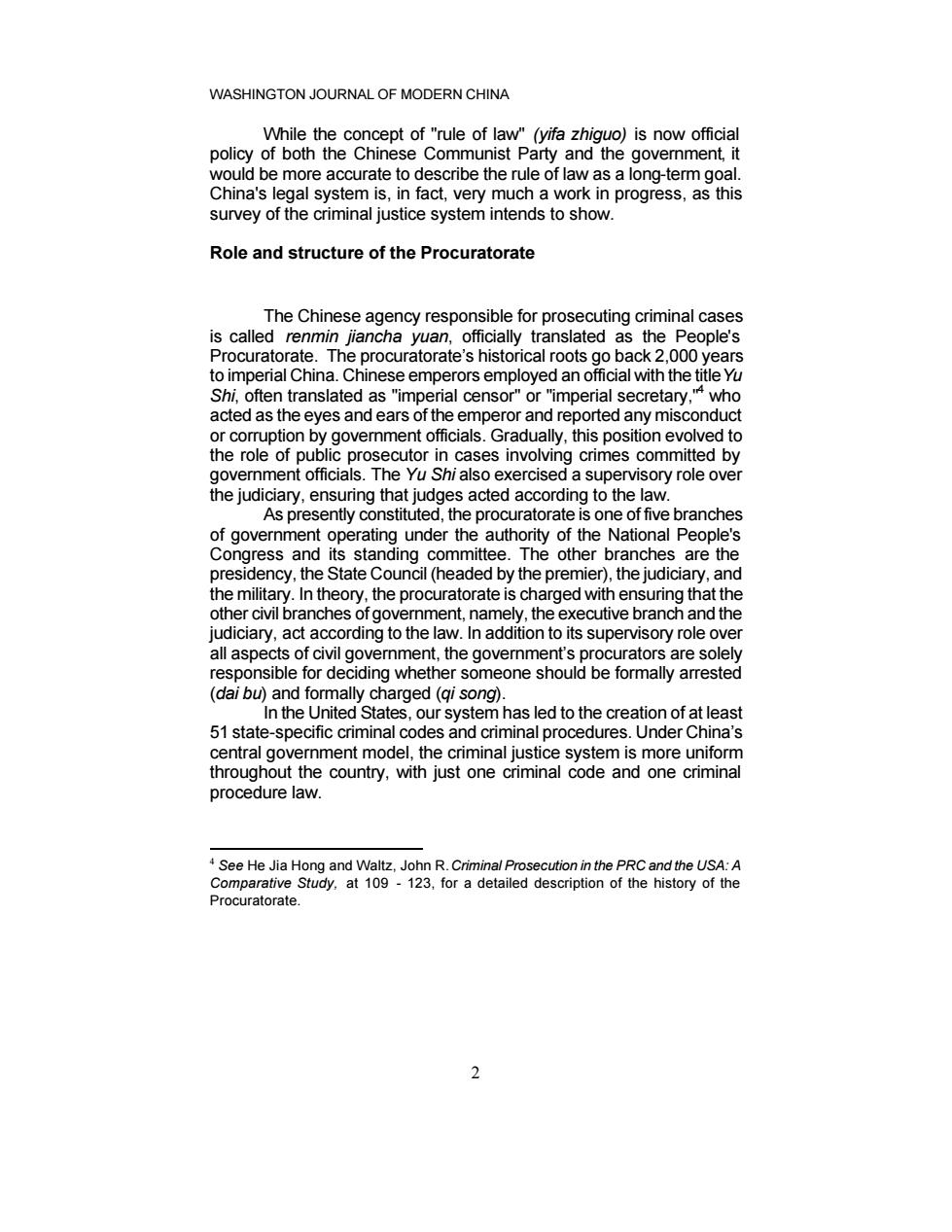正在加载图片...

WASHINGTON JOURNAL OF MODERN CHINA While the concept of "rule of law"(yifa zhiguo)is now official policy of both the Chinese Communist Party and the government,it would be more accurate to describe the rule of law as a long-term goal. China's legal system is,in fact,very much a work in progress,as this survey of the criminal justice system intends to show. Role and structure of the Procuratorate The Chinese agency responsible for prosecuting criminal cases is called renmin jiancha yuan,officially translated as the People's Procuratorate.The procuratorate's historical roots go back 2,000 years to imperial China.Chinese emperors employed an official with the title Yu Shi,often translated as "imperial censor"or "imperial secretary,"who acted as the eyes and ears of the emperor and reported any misconduct or corruption by government officials.Gradually,this position evolved to the role of public prosecutor in cases involving crimes committed by government officials.The Yu Shi also exercised a supervisory role over the judiciary,ensuring that judges acted according to the law. As presently constituted,the procuratorate is one of five branches of government operating under the authority of the National People's Congress and its standing committee.The other branches are the presidency,the State Council(headed by the premier),the judiciary,and the military.In theory,the procuratorate is charged with ensuring that the other civil branches of government,namely,the executive branch and the judiciary,act according to the law.In addition to its supervisory role over all aspects of civil government,the government's procurators are solely responsible for deciding whether someone should be formally arrested (dai bu)and formally charged (gi song). In the United States,our system has led to the creation of at least 51 state-specific criminal codes and criminal procedures.Under China's central government model,the criminal justice system is more uniform throughout the country,with just one criminal code and one criminal procedure law. See He Jia Hong and Waltz,John R.Criminal Prosecution in the PRC and the USA:A Comparative Study,at 109 -123,for a detailed description of the history of the Procuratorate. 2WASHINGTON JOURNAL OF MODERN CHINA 2 While the concept of "rule of law" (yifa zhiguo) is now official policy of both the Chinese Communist Party and the government, it would be more accurate to describe the rule of law as a long-term goal. China's legal system is, in fact, very much a work in progress, as this survey of the criminal justice system intends to show. Role and structure of the Procuratorate The Chinese agency responsible for prosecuting criminal cases is called renmin jiancha yuan, officially translated as the People's Procuratorate. The procuratorate’s historical roots go back 2,000 years to imperial China. Chinese emperors employed an official with the title Yu Shi, often translated as "imperial censor" or "imperial secretary,"4 who acted as the eyes and ears of the emperor and reported any misconduct or corruption by government officials. Gradually, this position evolved to the role of public prosecutor in cases involving crimes committed by government officials. The Yu Shi also exercised a supervisory role over the judiciary, ensuring that judges acted according to the law. As presently constituted, the procuratorate is one of five branches of government operating under the authority of the National People's Congress and its standing committee. The other branches are the presidency, the State Council (headed by the premier), the judiciary, and the military. In theory, the procuratorate is charged with ensuring that the other civil branches of government, namely, the executive branch and the judiciary, act according to the law. In addition to its supervisory role over all aspects of civil government, the government’s procurators are solely responsible for deciding whether someone should be formally arrested (dai bu) and formally charged (qi song). In the United States, our system has led to the creation of at least 51 state-specific criminal codes and criminal procedures. Under China’s central government model, the criminal justice system is more uniform throughout the country, with just one criminal code and one criminal procedure law. 4 See He Jia Hong and Waltz, John R. Criminal Prosecution in the PRC and the USA: A Comparative Study, at 109 - 123, for a detailed description of the history of the Procuratorate